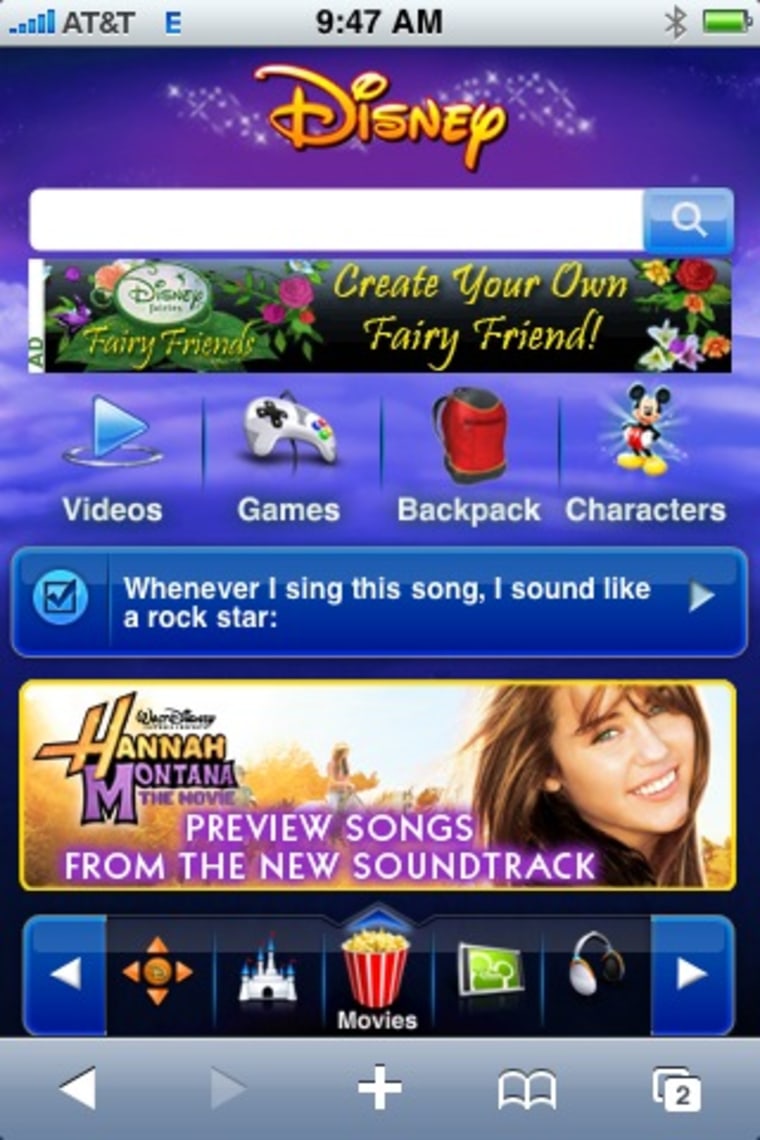Maybe “mobile Web browsing” should be called “mobile Web squinting” considering what it takes to view the Internet using a cell phone. Yet, largely because of Apple’s iPhone and other smartphones such as the BlackBerry and Palm, more users are checking the Internet this way, and the importance of those browsers are growing.
At CTIA, the wireless industry’s trade show this week, expect chatter about the mobile browser “wars,” with Opera Mini, long popular in Europe,likely soon to have more of a presence in the United States, and a test mobile version of another challenger, Firefox, underway.
Microsoft’s Internet Explorer, the dominant desktop Web browser for PCs, lags behind Apple’s Safari and Opera Mini in the mobile market. Company officials say improvements are coming to IE Mobile on new Windows-based phones due out later this year. (Msnbc.com is a joint venture of Microsoft and NBC Universal.)
In the meantime, Microsoft will launch a new test version of Windows Live Hotmail that can be used through a cell phone's Web browser, and has an improved look and search features, the company said.
Also coming: a new Palm Web browser to match the slickness of the company’s Pre smartphone, due out mid-year.
The iPhone has so captured and captivated eyeballs with its mobile browsing experience and its large, 3.5-inch display screen that Net Applications, which tracks Web data, started monitoring iPhone Web usage after the phone first went on sale in June 2007.
“We could see the impact the device would have in making mobile browsing more mainstream,” said Vince Vizzaccaro, an executive vice president of Net Applications.
Surfing by phone still represents less than 1 percent of all Web browsing, and “while that may not seem like a lot, mobile browsing accounted for less than 0.1 percent of all browsing before the iPhone was introduced,” Vizzaccaro said.
Smartphones with big display screens, such as the iPhone’s or the BlackBerry Storm’s, obviously make it easier to see Web pages, but not necessarily to use them. That’s where Web browsing software makes a difference.
Safari is the Web browser used by 77.5 percent of mobile surfers, according to a recent report from Net Applications. Opera Mini has a 9.1 percent market share, Internet Explorer 5.1 percent, and the remainder is divided among other mobile browsers, including Research In Motion’s BlackBerry browser, as well as Netscape and Blazer (primarily used on current Palm devices).
It’s quite the opposite on the desktop browsing front. There, Internet Explorer leads, with 67.4 percent of the market, although its market share is declining. A year ago Internet Explorer had nearly 75 percent of the market, according to Net Applications.
Firefox has 21.7 percent, and Safari 8 percent, according to Net Applications, with Google’s Chrome browser and Opera representing about 2 percent of the market.
Computer users can choose the Web browser, or even browsers, they want. It’s not unusual for PC users to have both Internet Explorer and Firefox on their desktops, and many Mac users have both Safari and Firefox.
But such choice hasn’t been common for cell phone users in the United States mainly because of restrictions by wireless carriers.
That’s been an issue for Norway-based Opera Mini, which at CTIA plans to announce agreements with United States carriers, signaling recognition of the role that browsers play for mobile surfers.

Daniel Goldman, editor of the Web site OperaWatch.com, and a former “technical evangelist” for Opera, said the mobile browser will benefit consumers who often have to spend extra minutes waiting for their cell phone’s Web browser to get them where they need to go. While a phone network's speed is a key factor, so is the Web browser that's being used to fetch and render pages.
“The installation size of Opera Mini is only around 100 kilobytes, compared to the size of multiple megabytes of other mobile browsers,” Goldman said.
Opera Mini, he said, “has the advantage of bringing you the full Web, rather than some watered-down ‘mobile’ Web,' " and “does all the pre-processing and compressing of the Web pages on back-end servers so that your phone doesn’t need to do any heavy lifting.”
Opera Mini is popular with BlackBerry users, he said, and also can be used on some mobile phones, such as Motorola’s RAZR V3 or Nokia’s 6682, said Nicole Leverich of AdMob, a mobile advertising network.
“The average consumer just uses the browser that comes on their mobile phone,” she said. “But that is starting to change as consumer get more sophisticated in their mobile Web usage, their phones get more advanced and they have more browser options.”
Apple, which blesses or rejects programs for the iPhone, has okayed lesser-known browsers — such as the Edge Browser, Nalu and Hot Browser — into its online App Store. But it’s not known whether Opera or Mozilla’s Firefox mobile browser, called Fennec, will be allowed for the iPhone.
Right now, Fennec is in beta, or review, form, available only for users of Nokia’s N810 Internet Tablet.
The non-profit Mozilla Foundation, which oversees Firefox, envisions a time where “your mobile content and experience isn’t separate and hard to integrate with your desktop experience,” foundation chairman Mitchell Baker said in a recent interview with Newsweek.
Right now, he said, “it’s hard for users — if you choose a handset, you (are limited by) what the handset can run, and then also by what the carrier permits. We hope to reduce that fragmentation over time. We’re still in the early stages.”
Microsoft hopes to play catch-up in the mobile browsing world with its improved Internet Explorer Mobile that will be part of the Windows Mobile operating system upgrade available on new phones later this year, a spokesman said.
“The new browser features easy, one-handed zoom and a new look and feel,” he said. “We believe this new browser brings the mobile browsing experiences on par with what people expect from their desktop computers.”
